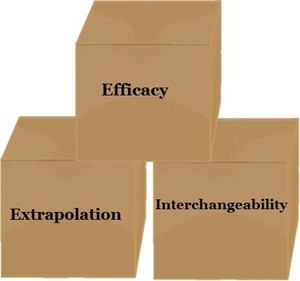Biosimilars have been available in Europe for more than seven years; despite this fact, physicians still have concerns about the use of biosimilars. Some of their concerns have been discussed by members and experts of the Working Party on Similar Biologic Medicinal Products of the European Medicines Agency (EMA) [1].
The need for post-marketing surveillance, efficacy, extrapolation and interchangeability are just some of the subjects that physicians have concerns about when it comes to biosimilars.
Post-marketing
The need for strict post-marketing surveillance and potentially large, post-marketing studies to provide reassurance regarding the safety of biosimilars, particularly epoetins, has been highlighted.
EMA requires that for a biosimilar, as for any new drug, a comprehensive risk management plan, including a plan for post-authorization safety surveillance, be submitted at the time of the marketing authorization application. EMA actively and comprehensively follows the safety of biosimilars and tailors the post-marketing programme for a specific biosimilar according to identified and potential safety concerns for the biosimilar, the reference biological and/or the substance class.
Biosimilar efficacy
The intention of biosimilar development is to show similarity with the reference biological, not to independently demonstrate patient benefit. The intention in this case is therefore for the biosimilar to demonstrate therapeutic equivalence with the reference biological. This infers that the biosimilar does not have better or worse efficacy than the reference biological, thus allowing the use of the same dosage for the same indication. The assumption that patients switched from an originator biological to the respective biosimilar may need to change dosage, dosage intervals, or route of administration is therefore unsubstantiated.
Extrapolated indications
Concerns have been expressed about using biosimilars in indications or in patient populations licensed on the basis of extrapolation of efficacy and safety data, i.e. in indications that are approved for the reference biological but for which the biosimilar has not been investigated.
Biosimilars, in contrast to small molecule chemical generics, cannot automatically claim all indications of the reference product and any extrapolation of data requires sound scientific justification. For extrapolation of data to be considered, the following requirements need to be fulfilled:
- Similarity with the reference product must be convincingly demonstrated, based on the totality of the evidence from a thorough comparability exercise.
- If clinical similarity can be shown in a key indication, extrapolation of efficacy and safety data to other indication(s) of the reference product may be possible, e.g. if the relevant mechanism of action and/or the receptor(s) involved in the extrapolated indications are the same.
- The safety profile of the biosimilar must have been properly characterized and unacceptable immunogenicity excluded.
Consequently, extrapolation of data to other indications of the reference biological — and thus formal lack of a clinical trial in the respective clinical indication — does not imply less reassurance as regards to efficacy and safety of the biosimilar if all the aforementioned considerations are taken into account.
Interchangeability
In the EU, decisions on the interchangeability or substitution of biosimilars and originator biologicals are not made by EMA but at the national level, despite the fact that biosimilars developed in line with the EU requirements are considered by EMA to be therapeutic alternatives to their reference biologicals.
The main argument against automatic substitution is the concern regarding traceability, which is necessary for analyzing the cause when an adverse drug reaction occurs. Another, more theoretical concern regarding automatic substitution is the possibility that repeated switches between the biosimilar and the reference biological may increase immunogenicity with potentially negative effects on the safety and/or efficacy of the products. This would, however, also apply to switches between different originator biologicals of the same class.
According to EMA, automatic substitution has not been implemented for any biosimilar in the EU; and according to the European Generic medicines Association, more than 12 countries across Europe have introduced rules to prevent automatic substitution of biological medicines by biosimilars.
Editor’s comment
The research paper highlights the fact that there is insufficient data on the safety and efficacy issues of biosimilars in the public domain. GaBI Journal is created to fill this information gap; GaBI Journal welcomes submission of research manuscripts for peer review publication.
If you are interested in contributing a research article in a similar area to GaBI Journal, please send us your submission here.
Related articles
Quality, similarity and safety of biosimilars
How are biosimilars special
Small molecule versus biological drugs
Reference
1. Weise M, et al. Biosimilars: what clinicians should know. Blood. 2012;120(26):5111-7.
Permission granted to reproduce for personal and educational use only. All other reproduction, copy or reprinting of all or part of any ‘Content’ found on this website is strictly prohibited without the prior consent of the publisher. Contact the publisher to obtain permission before redistributing.








 0
0











Post your comment